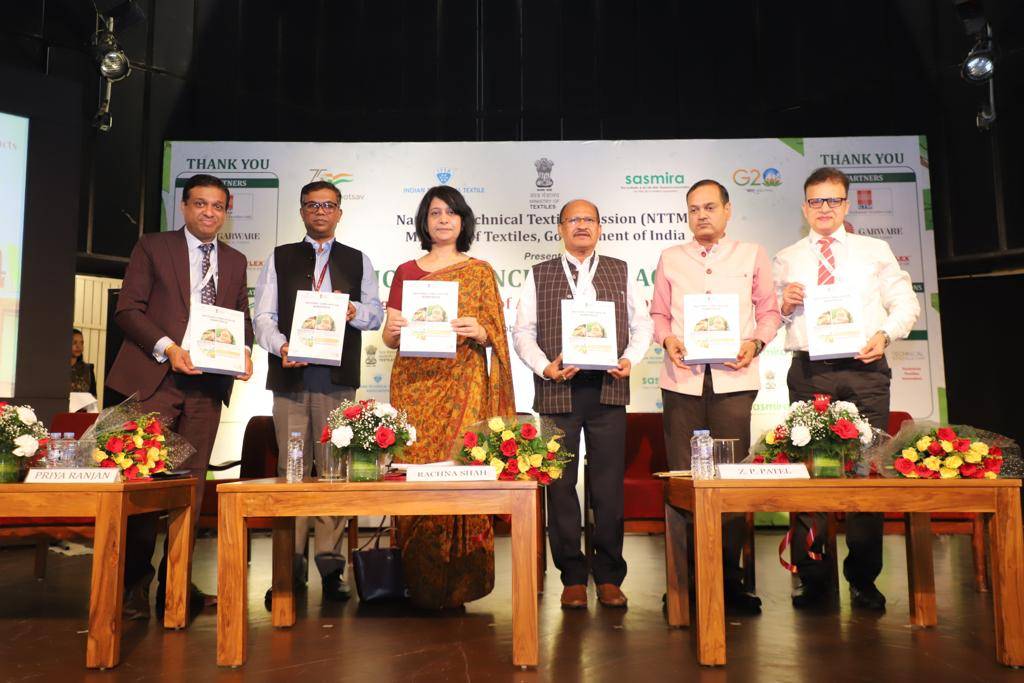
The Ministry of Textiles, under its flagship initiative, the National Technical Textile Mission (NTTM), organized a National Conference on Agrotech to highlight the important role of enhancing the productivity of agricultural and horticultural products in India.
Organized in collaboration with Indian Technical Textile Association (ITTA) and Synthetic & Art Silk Mills’ Research Association (SASMIRA), the event brought together experts, officials and stakeholders from various fields. The conclave included five technical sessions focusing on sustainable and resilient agricultural innovations in agro-textiles, Indian standards, and quality control orders (QCOs), performance and sustainability of agro-textiles, as well as recent developments in agrotech technology, including Digital transformations in agriculture and horticulture
A special session was dedicated to exploring future growth opportunities in agro-textiles, and during the event, a conclave booklet and a report on opportunities for the Indian agrotech industry: ‘Fiber to Field’ were unveiled. More than 150 participants, including officials and representatives of central ministries, consumer departments of central and state governments, institutions, industry leaders, scientists, researchers, and agro-textile professionals attended the conference.
Rachna Shah, Secretary, Ministry of Textiles, Government of India, emphasized the important role of agriculture in the Indian economy, which consistently accounts for around 18-20% of the country’s GDP. He noted that agro-textiles can address unique agricultural challenges such as climate change, water constraints and high demand for agricultural production on limited arable land. The use of agro-textiles has been instrumental in improving agricultural productivity and quality of agro-based products by extending the growing period of crops and protecting plants from adverse weather conditions and pests, among other benefits.
Research and studies have highlighted the significant impact of agro-textiles on horticulture, resulting in 2-5 times increase in crop yield, higher crop intensity, 30-45% reduction in water use, fertilizer use. 25-30% reduction, and increased. Harvest cycles every year. Shah called for collaboration between certification agencies, research organizations, industry, academia and the ministry to increase awareness and education among farmers to address the cost implications of agro-textiles and for widespread adoption.
ZP Patel, Vice-Chancellor, Nausari Agriculture University, highlighted that climate change, especially in rainfed areas, causes a loss of 10-40% in average agricultural production. Agricultural textiles, including crop covers, mulch mats, and polyhouses, have the potential to regulate and stimulate microclimates for crops, leading to higher agricultural yields. Patel emphasized the need for biodegradable agro-fiber-based agro-bags, innovative agro-textile products such as soil-degradable agro-fabrics, and super-absorbent polymer fibers to address various agricultural challenges.
Rajeev Saxena, Joint Secretary, Ministry of Textiles, Government of India, pointed out that India has significant potential in the global agro-textile market, which is valued at around US$ 12 billion, of which India has a share of around 3%. He highlighted that the Ministry of Textiles has notified Quality Control Orders (QCOs) for 20 agro-textile items, which will be effective from April 1, 2024, ensuring high quality and safety. The Ministry has approved 11 R&D projects in agro-textiles worth Rs 13.67 crore for development of innovative products. Saxena also announced the establishment of a Climate Smart Agro-Textile Demonstration Center in partnership with SASMIRA to revolutionize agriculture through digitized microclimate farming.
Priya Ranjan, Joint Secretary (INM Horticulture), Ministry of Agriculture and Farmers’ Welfare, emphasized the important role of agro-textiles in addressing the challenges faced by the agriculture sector due to climate change, soil degradation and water scarcity. gave He noted that schemes like the Mission for Integrated Development of Horticulture (MIDH) have included various agro-textile products for widespread use. Ranjan highlighted the potential of adopting modern technology in agro-textiles to increase agricultural production, reduce input costs and ultimately increase farmers’ income.
Ashok Tiwari, Senior Director, SASMIRA, appreciated the support of the Ministry of Textiles and the participation of dignitaries from various organizations in the conclave.
First Published: 06 Oct 2023, 22:28 IST
